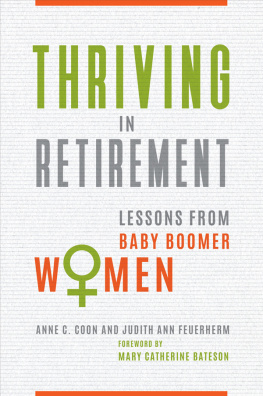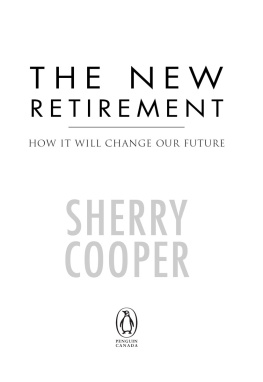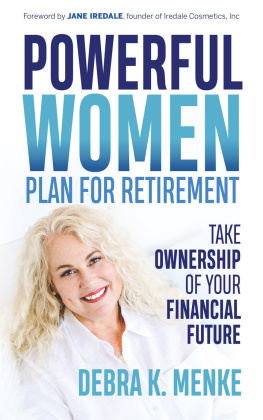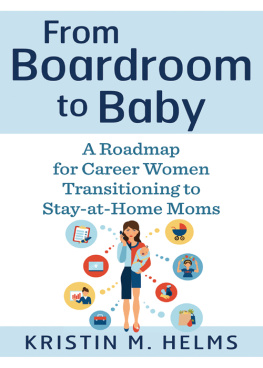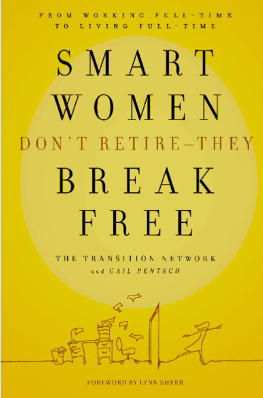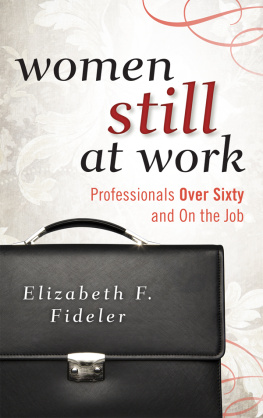Thriving in
Retirement
Lessons from Baby Boomer Women
Anne C. Coon and
Judith Ann Feuerherm
Foreword by Mary Catherine Bateson

Copyright 2017 by Anne C. Coon and Judith Ann Feuerherm
All rights reserved. No part of this publication may be reproduced, stored in a retrieval system, or transmitted, in any form or by any means, electronic, mechanical, photocopying, recording, or otherwise, except for the inclusion of brief quotations in a review, without prior permission in writing from the publisher.
Library of Congress Cataloging-in-Publication Data
Names: Coon, Anne Christine, author. | Feuerherm, Judith Ann, author.
Title: Thriving in retirement : lessons from baby boomer women/Anne C. Coon and Judith Ann Feuerherm ; foreword by Mary Catherine Bateson.
Description: Santa Barbara, California : Praeger, [2017] | Includes bibliographical references.
Identifiers: LCCN 2017024378 (print) | LCCN 2017036899 (ebook) | ISBN 9781440859977 (ebook) | ISBN 9781440859960 (alk. paper)
Subjects: LCSH: WomenEmploymentUnited States. | WomenRetirementUnited States. | Baby boom generationUnited States.
Classification: LCC HD6095 (ebook) | LCC HD6095 .C72 2017 (print) | DDC 331.40973dc23
LC record available at https://lccn.loc.gov/2017024378
ISBN: 9781440859960
EISBN: 9781440859977
21 20 19 18 17 1 2 3 4 5
This book is also available as an eBook.
Praeger
An Imprint of ABC-CLIO, LLC
ABC-CLIO, LLC
130 Cremona Drive, P.O. Box 1911
Santa Barbara, California 93116-1911
www.abc-clio.com
This book is printed on acid-free paper 
Manufactured in the United States of America
To Kurt Feuerherm and to Craig Zicari
Contents
Foreword
In the United States, in the course of the twenty-first century, one group after another came forward demanding fuller participation in the professions and in governance. The first of these movements was the Civil Rights Movement; the second, new wave feminism, followed by persons with disabilities and gay rights (now LGBTQ rights). We are currently in the process of working toward a new understanding of later adulthood to reap the benefit of increased longevity. In every one of these cases, the efforts of a marginalized group to achieve recognition have had broad implications for society.
In trying to describe the changes in womens lives, I have struggled to find metaphors that express the novelty and the achievement involved. When women were speaking of juggling, an anxiety-producing metaphor, I suggested that they think of themselves as artists composing lives consisting of diverse and changing components. The process is creative . When men and women faced perplexity about life after retirement, I emphasize that an artistic composition could involve balance and harmony of diverse components across time as well as in space and found myself emphasizing that increased longevity is not just an add-on but that, like a room added to a house, it leads to changes in the use of all the other rooms (or eras). And I added to the metaphor a life as a house of multiple rooms to live in, the metaphor of an atrium: a central space with multiple doors in different directions, open to the sky, a new kind of freedom. Anne Coon and Judy Feuerherm have described that new and amazingly open room, through which the men and women of the Baby Boom are currently passing.
Some thirty years were added to life expectancy at birth in the twentieth century, primarily by scientific research and cultural changes. I believe that this change may prove to be as significant in human evolution as the extension of dependent childhood. The human pattern of survival is based not on fixed, inborn patterns of behavior, as in most of animal species, but on learning that can take very different forms and continues throughout the life course. It is this plasticity that has allowed humans to develop ways of living virtually everywhere on the planet and that offers hope that we will find the capacity for change that will be needed during the ecological and climatic disruption that lies ahead. Everywhere childhood seems to be getting longer, and lifelong learning is becoming a watchword, as it needs to be. Dependency is seen by many as a negative concept, but it is in the long period of childhood dependency that humans learn both love and trust and perhaps the courage to go forward into continuing change. I believe that interdependence and the empathy that supports cooperation are precisely what we need in our uncertain future.
What is most striking about the late adulthood choices made by these Boomer women is their movement into areas of change. They have found their careers in spaces created by twentieth-century feminism, and many of these are spaces that did not exist previously, new professions. Two striking examples are coaching (life or career coaching, not athletic coaching) and museum curating (such as caring for and making choices in museum collections). Other examples have to do with guiding technological change in the workplace and outplacement. The theme of giving back or making a contribution is also an important one.
Women seem to be becoming more thoughtful than men about what to do in later adulthood, for several reasons. Ageism is still more prevalent directed at women, so finding a role that is satisfying and effective is more challenging. More important, however, is the fact that women coming up on retirement today have already experienced a reassessment of their roles during the feminist movement: they have looked at what they might have taken for granted and recognized some of their assumptions as internalized oppression, negative stereotypes to be put aside as they have claimed new freedom and new creativity. Furthermore, in many cases, having managed careers of multiple commitments, they are less narrowly focused than many men, more aware of the possible implications of decisions made for the wider human and ecological community. Because there is still a tendency for men to marry younger women, women maintain caregiving roles as wives and as grandparents longer than men. Add to this the fact that the need to adapt flexibly to moves forced by a husbands career changes may now be replaced by the need to adapt to moves to comfortable retirement sites where a wifes career shaped over many years may be interrupted. These factors mean that once again, as couples look toward their later years, women find themselves again looking within themselves and raising consciousness of their identities and goals. No wonder some find their way into life coaching and, indeed, into curating their own lives, for as one woman told the authors, The wisdom part comes from choices. This is active wisdom, associated not with a rocking chair but with moving forward.
These are women who were given little career guidance but were told that they could do whatever they set their minds on. Their choices are examples of creativity guided by common sense and the understanding that satisfaction comes from engagement. My advice to women reassessing their investment of themselves in later adulthood is biblical, for where your treasure is (your time, talent, and skills), there will your heart be also. They are scouts entering a new landscape and modeling a sense of possibility to those who will followincluding the men in their lives.
Mary Catherine Bateson

